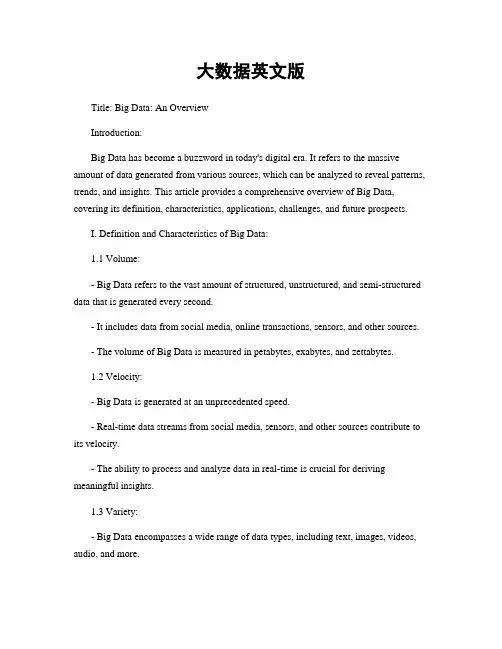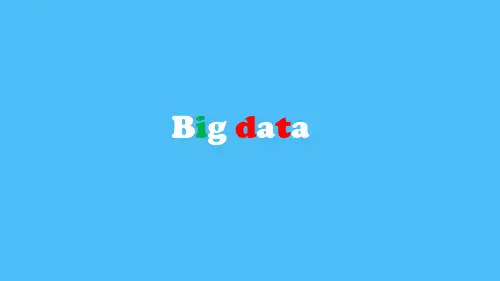大数据英语PPT
- 格式:ppt
- 大小:1.60 MB
- 文档页数:14


大数据英文版Title: Big Data: An OverviewIntroduction:Big Data has become a buzzword in today's digital era. It refers to the massive amount of data generated from various sources, which can be analyzed to reveal patterns, trends, and insights. This article provides a comprehensive overview of Big Data, covering its definition, characteristics, applications, challenges, and future prospects.I. Definition and Characteristics of Big Data:1.1 Volume:- Big Data refers to the vast amount of structured, unstructured, and semi-structured data that is generated every second.- It includes data from social media, online transactions, sensors, and other sources.- The volume of Big Data is measured in petabytes, exabytes, and zettabytes.1.2 Velocity:- Big Data is generated at an unprecedented speed.- Real-time data streams from social media, sensors, and other sources contribute to its velocity.- The ability to process and analyze data in real-time is crucial for deriving meaningful insights.1.3 Variety:- Big Data encompasses a wide range of data types, including text, images, videos, audio, and more.- It includes structured data from databases, semi-structured data from XML files, and unstructured data from emails, social media posts, etc.- The variety of data poses challenges in terms of storage, processing, and analysis.II. Applications of Big Data:2.1 Business Analytics:- Big Data analytics helps organizations gain insights into customer behavior, market trends, and competitive intelligence.- It enables businesses to make data-driven decisions, optimize operations, and improve customer satisfaction.- Predictive analytics and machine learning algorithms are used to identify patterns and predict future outcomes.2.2 Healthcare:- Big Data plays a significant role in healthcare by analyzing patient records, medical images, and genomic data.- It helps in disease diagnosis, personalized medicine, drug discovery, and healthcare resource management.- Real-time monitoring of patient data can detect anomalies and provide timely interventions.2.3 Smart Cities:- Big Data analytics is used in urban planning, transportation management, and energy optimization in smart cities.- It enables the collection and analysis of data from sensors, CCTV cameras, and social media to improve city services.- Predictive models can be created to optimize traffic flow, reduce energy consumption, and enhance public safety.III. Challenges in Big Data:3.1 Data Privacy and Security:- With the increasing volume and variety of data, ensuring data privacy and security becomes crucial.- Organizations must comply with regulations and implement robust security measures to protect sensitive information.- Techniques like encryption, access controls, and anonymization are used to safeguard data.3.2 Data Quality and Integration:- Big Data often comes from disparate sources, leading to data quality issues.- Data integration and cleansing techniques are used to ensure the accuracy and consistency of data.- Data governance frameworks are implemented to maintain data integrity and reliability.3.3 Scalability and Infrastructure:- Big Data requires scalable storage and processing infrastructure to handle large volumes of data.- Distributed computing frameworks like Hadoop and Spark are used to process data in parallel.- Cloud computing provides on-demand scalability and cost-effective solutions for Big Data processing.IV. Future Prospects of Big Data:4.1 Artificial Intelligence and Machine Learning:- Big Data and AI are closely intertwined, with AI algorithms driving insights from Big Data.- Machine learning techniques enable automated data analysis, pattern recognition, and predictive modeling.- The integration of Big Data and AI will continue to advance automation and decision-making.4.2 Internet of Things (IoT):- The proliferation of IoT devices generates massive amounts of data, contributing to Big Data.- IoT data combined with Big Data analytics can optimize processes, improve efficiency, and enable new services.- The integration of IoT and Big Data will revolutionize industries like manufacturing, transportation, and healthcare.4.3 Ethical Considerations:- As Big Data becomes more prevalent, ethical considerations surrounding data usage and privacy will gain importance.- Organizations need to establish transparent data governance policies and ensure responsible data handling practices.- The ethical use of Big Data will be crucial in maintaining trust and avoiding potential societal risks.Conclusion:Big Data is transforming the way businesses, industries, and societies operate. Its vast volume, high velocity, and diverse variety present both opportunities and challenges. By harnessing the power of Big Data analytics, organizations can gain valuable insights,make informed decisions, and drive innovation. However, ethical considerations and data privacy must be addressed to ensure responsible and sustainable use of Big Data in the future.。








